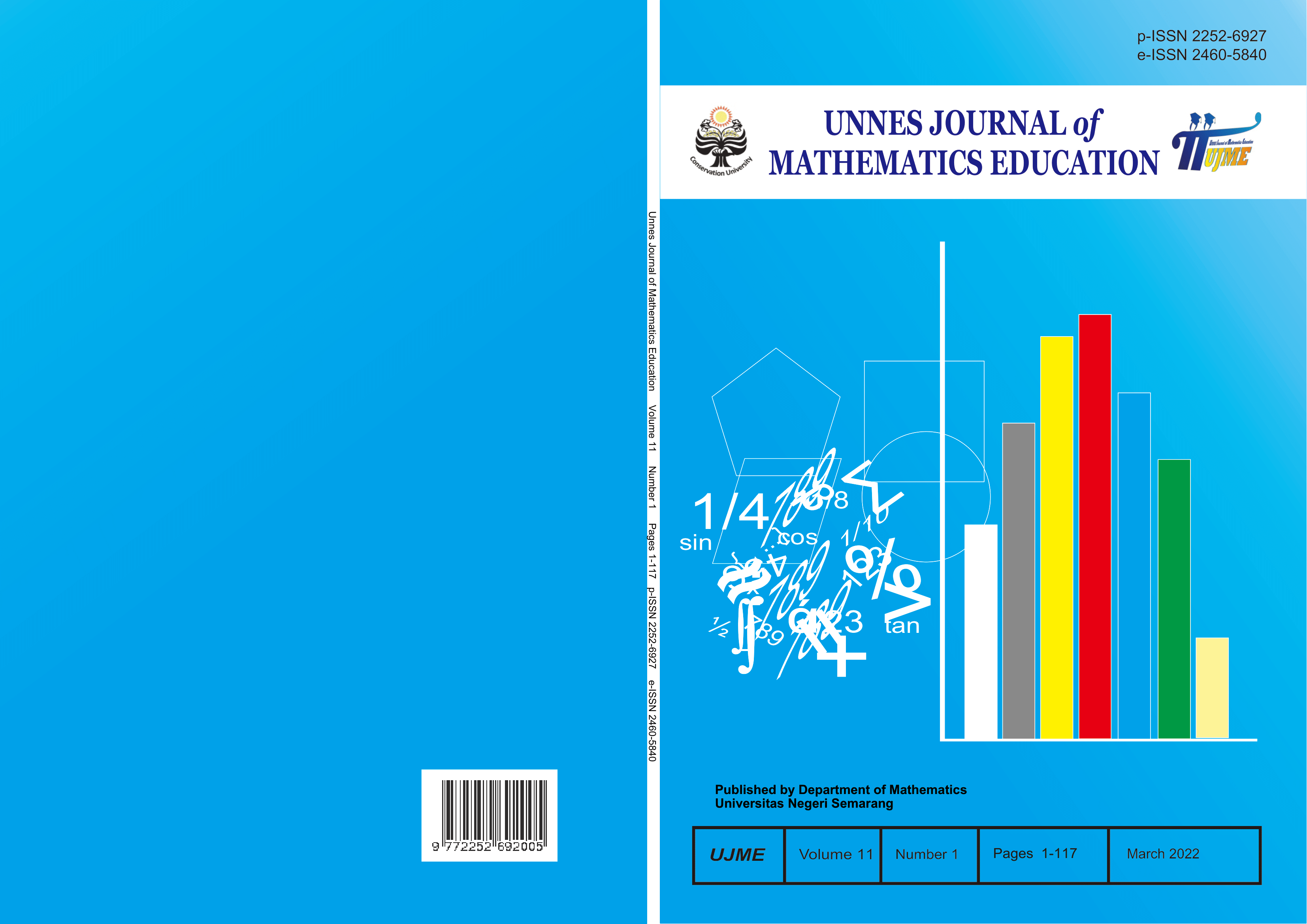Development of STEAM-based JHS Mathematics Teaching Material to Enhance Students' Mathematical Connection
##plugins.themes.academic_pro.article.main##
Abstract
One of skills needed in the disruption era is the mathematical connection ability. However, this ability has not been optimally facilitated through learning process. In fact, the disruption era also encourages renewal, one of which is through the provision of quality learning resources both in terms of content and approach. In addition, the disrupstion era has also led to various approaches that more suitable with existing developments and changes, such as the STEAM approach. Therefore, it is important to develop a qualified STEAM-based mathematics teaching material to improve students' mathematical connection abilities. The development of this teaching material uses a modified Borg and Gall model of research and development (R&D) method. There are ten stages that aim to develop and describe the quality of STEAM-based mathematics teaching materials in three indicators, namely validity (characteristics suitability and feasibility), practicality (readability), and effectiveness in improving students' mathematical connection abilities. The final results are STEAM-based mathematics teaching materials that are valid (meet the teaching materials characteristics suitability and include in the very feasible category with feasibility score of 89,09%), practical (easy to understand with readability score of 67.13%), and effective in improving students’ mathematical connection abilities with moderate improvement category (with gain normalization index score of 0.395).
##plugins.themes.academic_pro.article.details##
References
Ata-Aktürk, A., & Demircan, H. Ö. (2017). A Review of Studies on STEM and STEAM Education in Early Childhood. Journal of Kırşehir Education Faculty (JKEF), 18(2), 757–776. Retrieved from https://www.researchgate.net/publication/319702309_A_Review_of_Studies_on_STEM_and_STEAM_Education_in_Early_Childhood
Choi, J. H., & Hwang, B. K. (2018). The Concepts, Strategies and Application of STEAM Education in South Korea. Proceedings - 2017 7th World Engineering Education Forum, WEEF 2017- In Conjunction with: 7th Regional Conference on Engineering Education and Research in Higher Education 2017, RCEE and RHEd 2017, 1st International STEAM Education Conference, STEAMEC 201, 466–469. Doi: https://doi.org/10.1109/WEEF.2017.8467045
Hasbi, M., Lukito, A., & Sulaiman, R. (2019). The Realistic of Mathematic Educational Approach to Enhancing Ability Mathematical Connections. International Journal of Trends in Mathematics Education Research, 2(4), 179–183. Doi: https://doi.org/10.33122/ijtmer.v2i4.
Kang, N.-H. (2019). A review of the effect of integrated STEM or STEAM (science, technology, engineering, arts, and mathematics) education in South Korea. Asia-Pacific Science Education, 5(1). Doi: https://doi.org/10.1186/s41029-019-0034-y.
Kusjuriansah, K., & Yulianto, A. (2019). Pengembangan bahan ajar fisika berbasis i-sets terkomplementasi karakter pada materi hukum gravitasi newton. UPEJ Unnes Physics Education Journal, 8(2), 120-132. Doi: https://doi.org/10.15294/upej.v8i2.33314.
Latha, S., & B., P. C. (2020). Vuca in Engineering Education: Enhancement of Faculty Competency For Capacity Building. Procedia Computer Science, 172, 741–747. Doi: https://doi.org/10.1016/j.procs.2020.05.106.
Lubis, F. (2019, November). Education in the Disruption Era. Britain International of Linguistics, Arts and Education (BIoLAE) Journal, 1(2), 183-188. Doi: https://doi.org/10.33258/biolae.v1i2.85.
Mayembe, E., & Nsabata, S. (2020). Print Based Learning Media. Journal Educational Verkenning, 1(1), 001-007. Doi: https://doi.org/10.48173/jev.v1i1.23.
Niam, M. A., & Asikin, M. (2020). The Development of Science, Technology, Engineering, and Mathematics (STEM)-Based Mathematics Teaching Materials To Increase Mathematical Connection Ability. MaPan, 8(1), 153. Doi: https://doi.org/10.24252/mapan.2018v8n1a12.
Menanti, H., Sinaga, B., & Hasratuddin, D. (2018). Improve Mathematical Connections Skills with Realistic Mathematics Education Based Learning. 3rd Annual International Seminar on Transformative Education and Educational Leadership (AISTEEL 2018), 200, 29–35. Doi: https://doi.org/10.2991/aisteel-18.2018.7.
OECD. (2018b). What 15-year-old students in Indonesia know and can do. Programme for International Student Assessment (PISA) Result from PISA 2018, 1–10. Retrieved from http://www.oecd.org/pisa/ Data.
Puspendik. (2019b). Laporan Hasil Ujian Nasional. Retrieved from https://hasilun.puspendik.kemdikbud.go.id.
Ramadani, E. (2020). Pengembangan Handout Matematika Berbasis Pendekatan STEAM (Science, Technology, Engineering, Arts, and Mathematics) pada Materi Segitiga dan segiempat untuk Peserta didik Kelas VIII SMP. (Bachelor’s Thesis). Universitas Jambi. Retrieved from https://repository.unja.ac.id/id/eprint/10678%0A.
Ruangsiri, K., Nuangpirom, P., & Akatimagool, S. (2020). Promotion of High-Order Analytical Thinking Skills using NCOM Simulator through STEAM Education. 2020 7th International Conference on Technical Education (ICTechEd7), Bangkok, Thailand, 19–23. Doi: https://doi.org/10.1109/ICTechEd749582.2020.9101305.
Sari, D. I., Rejekiningsih, T., & Muchtarom, M. (2020). Students' Digital Ethics Profile in the Era of Disruption: An Overview from the Internet Use at Risk in Surakarta City, Indonesia. International Association of Online Engineering, 14(3), 82-94. Doi: https://doi.org/10.3991/ijim.v14i03.12207.
Sugiyono. (2017). Metode Penelitian Pendidikan. Bandung: Alfabeta.
Syakdiyah, A., Nurmahmudah, F., & Wijayanti, W. (2019). Active Learner Strategies in Era of Disruption: a Literature Review. Advances in Social Science, Education and Humanities Research, 317, 165-168. Doi: https://doi.org/10.2991/iconprocs-19.2019.34.
Utami, T. N., Jatmiko, A., & Suherman. (2018). Pengembangan Modul Matematika dengan Pendekatan Science, Technology,Engineering,and Mathematics (STEM) pada Materi Segiempat. Desimal: Jurnal Matematika, 1(2), 165-172. Doi: https://doi.org/10.24042/djm.v1i2.2388.
Yakman, G. (2008). STEAM EDUCATION an overview of creating a model of integrative education. Retrieved from https://www.researchgate.net/publication/327351326
